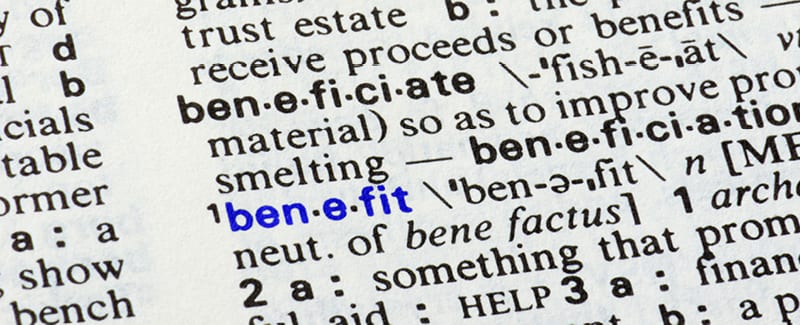
The term beneficiary is defined generally as a person or thing that receives help or advantage from something, or one that benefits from something. But in legal parlance, it means different things in different contexts. Here is an overview of the different types of beneficiaries one might happen to be or need to find.
The beneficiary of a life insurance policy is the person or entity that was designated by the insured to receive the death benefit of that policy. The insured can designate more than one beneficiary.
The primary beneficiary or beneficiaries are the first who receive the benefit. The insured can also name contingent beneficiaries so that if the primary beneficiary predeceases the insured, someone is available to accept the death benefit.
Beneficiary designations are either revocable or irrevocable. A person purchasing a life insurance policy may want to name revocable beneficiaries if he or she does not have children yet, but plans to. This way, when children are born, the insured can change the beneficiaries.
A beneficiary of a will is entitled to receive some property or security designated by a deceased individual in his or her last will and testament. All of the assets belonging to the deceased at the time of death are considered the deceased’s “estate,” so a beneficiary of a will could also be considered a beneficiary of an estate.
The beneficiary of a trust is a person, persons, or entity that the trust was created for. The trust creator, called the “grantor,” designates beneficiaries and appoints a trustee, who has a fiduciary duty to manage the trust assets in the best interests of the beneficiary.
Beneficiaries ultimately gain ownership and control of a revocable trust capital and the income that capital generates. This is common when, for example, parents establish a revocable trust in favor of a child, giving that child control of the trust upon reaching the age of maturity or upon the parents’ death. It is called a “revocable” trust because the grantor(s) can change beneficiaries or terminate the trust at any time.
The terms of an irrevocable trust cannot be changed by a grantor without the permission of the beneficiaries.
A Medicare beneficiary is someone who:
Federal law dictates the terms of Medicare coverage.
An Advance Beneficiary Notice, also known as an ABN or waiver of liability, is a notice that a medical provider gives to a Medicare beneficiary if the provider has reason to believe Medicare will deny coverage for a particular service.
An ABN warns the beneficiary that Medicare may deny coverage for the service and allows the beneficiary to decide whether to have the service performed and accept financial responsibility for it. If the beneficiary signs the ABN, agreeing to pay for the service if not covered and receives the service, then the provider submits the claim to Medicare, who then determines whether or not the service will be covered.
A Medicare beneficiary in this situation must always ask the provider to submit the bill to Medicare first – the provider is under no obligation to do this once you’ve signed an ABN.
A beneficiary can be any person or entity that the owner of a retirement account designates as the recipient after he or she dies. Beneficiaries should keep in mind that there are tax implications to receiving these funds, and what options retirement account beneficiaries have depends upon their relationship to the deceased.
Spouses of the deceased who are beneficiaries of a retirement account can either
A spouse does not pay tax on the deceased’s retirement account until he or she takes distributions.
Anyone other than a spouse of the deceased cannot treat the account is their own, meaning, they cannot make any contributions to it or rollover any funds to or from that account. But again, there is no federal tax owed until distributions are taken. In the case of a Roth IRA, the entirety must be distributed by the end of the fifth year after the original owner’s death.
A beneficial owner is one who enjoys the possession and use of something, who does not have legal title to it. In the U.S., this is governed by state law but in general, an individual will enjoy certain property rights in equity while someone else owns the legal title.
This applies commonly to real property. For example, an individual might retain a life estate in a home (meaning, he or she can live there or otherwise use the home until death) while someone else is the deeded owner.
It is also used in copyright law, where the creator of intellectual property transfers some rights to the use of it to an employer, who becomes the beneficial owner. The creator then retains a future interest in the property, such as the right to copyright renewal.
The term “beneficial ownership” is also used in domestic and international commercial law to refer to anyone who enjoys the benefits of ownership of a security or of property, without being the record owner. The legal owner is called the “registered owner.”
So what exactly is this? Registered/legal owners of property can use beneficial ownership to shield themselves from liability and in some cases, hide their identity. For example, the registered owner of a ship can conceal ownership by establishing a shell corporation to designate as a beneficial owner – the beneficial owner is legally and financially responsible for the ship and whatever the ship does.
©2011-2025 Worthy, Inc. All rights reserved.
Worthy, Inc. operates from 25 West 45th St., 2nd Floor, New York, NY 10036